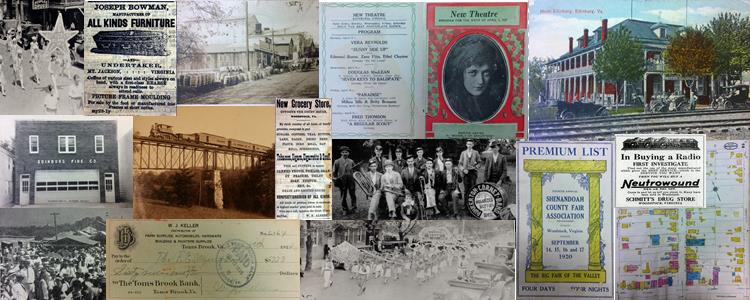Orkney Springs
Files
ZORK_OPENTitle
Orkney Springs
Subject
Orkney Springs (Va.)
Description
From it’s found in the mid-1770s, the Orkney Springs Community has been welcoming visitors. Surrounding it was a plethora of springs that reportedly had healing powers. People from around the country flocked to the area to find a cure to their ailments or to simply rest and relax.
To house these individuals several hotels have been built in the area. The first of these was an 18th century log building that also served as the area’s Indian trading post. In 1845 it was named the Naason Bare Log Hotel after its new owner, Nasson Bare. Research has discovered this hotel had a large dining room, dance hall, and running water supplied by wooden pipes that ran from some local springs. This structure survived until 1900 when it was demolished.
By 1829 Valley Historian Samuel Kerchval reported it had been joined by between ten and twenty buildings that served as hotels or support facilities. This number would grow in the 1840s when the Howard’s Lick Turnpike connected Mt. Jackson to Orkney Springs and other resorts in West Virginia. This road intersected with the new railroad and allowed travelers to reach the area much easier.
Around 1850 the first portion of the current Orkney Springs Hotel was completed. Called the Maryland House, this structure was designed to be the first part of a magnificent resort owned by a joint stock company. However, the Civil War interrupted construction and Maryland House served as a hospital for recovering Confederate soldiers.
Construction resumed in 1867. By 1873 four new buildings and seven cottages had been added. Owners at that time were J.W.R Moore and Joseph Perry. They also oversaw construction of the main hotel building, called Virginia, that same year. This five story building originally featured a ballroom, grand parlor, six “retiring” parlors, a billiard room, reading room, reception room, and barroom. This hotel would host numerous major political and social events.
In 1925 the Episcopal Church, under Dr. Edmund Woodward, dedicated the Cathedral Shrine of the Transfiguration nearby. This continued a long connection between religious services and the hotel. Eventually this led to the creation of Shrine Mont, an Episcopalian retreat that today owns the Orkney Hotel and surrounding structures. Regularly this site hosts hundreds of camp attendees, church conference participants, and individuals seeking to relax in the mountains.
Locals also continue to use the site, its recreation facilities, and many of the festivals it hosts each year including the Shenandoah Valley Music Festival. It also provides much needed jobs.
To house these individuals several hotels have been built in the area. The first of these was an 18th century log building that also served as the area’s Indian trading post. In 1845 it was named the Naason Bare Log Hotel after its new owner, Nasson Bare. Research has discovered this hotel had a large dining room, dance hall, and running water supplied by wooden pipes that ran from some local springs. This structure survived until 1900 when it was demolished.
By 1829 Valley Historian Samuel Kerchval reported it had been joined by between ten and twenty buildings that served as hotels or support facilities. This number would grow in the 1840s when the Howard’s Lick Turnpike connected Mt. Jackson to Orkney Springs and other resorts in West Virginia. This road intersected with the new railroad and allowed travelers to reach the area much easier.
Around 1850 the first portion of the current Orkney Springs Hotel was completed. Called the Maryland House, this structure was designed to be the first part of a magnificent resort owned by a joint stock company. However, the Civil War interrupted construction and Maryland House served as a hospital for recovering Confederate soldiers.
Construction resumed in 1867. By 1873 four new buildings and seven cottages had been added. Owners at that time were J.W.R Moore and Joseph Perry. They also oversaw construction of the main hotel building, called Virginia, that same year. This five story building originally featured a ballroom, grand parlor, six “retiring” parlors, a billiard room, reading room, reception room, and barroom. This hotel would host numerous major political and social events.
In 1925 the Episcopal Church, under Dr. Edmund Woodward, dedicated the Cathedral Shrine of the Transfiguration nearby. This continued a long connection between religious services and the hotel. Eventually this led to the creation of Shrine Mont, an Episcopalian retreat that today owns the Orkney Hotel and surrounding structures. Regularly this site hosts hundreds of camp attendees, church conference participants, and individuals seeking to relax in the mountains.
Locals also continue to use the site, its recreation facilities, and many of the festivals it hosts each year including the Shenandoah Valley Music Festival. It also provides much needed jobs.
Source
Herb Parker Postcard Collection
Publisher
Shenandoah County Library
Date
1910
Rights
Not to be republished without permission
Format
Image
Language
English
Identifier
650
Collection
Citation
“Orkney Springs,” Shenandoah County Library Archives, accessed February 23, 2026, https://archives.countylib.org/items/show/5562.



Comments